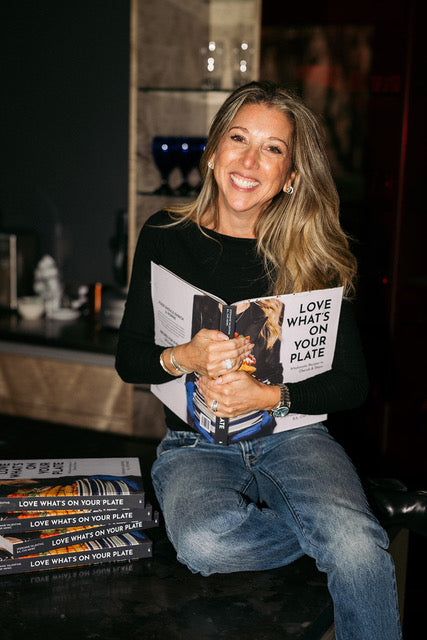4-5 minute read
We changed the clocks last weekend, and if you've been feeling off since then, you're not imagining it. That missing hour of evening sunlight? Your body noticed, even if you told yourself it was no big deal.
I've been watching the leaves fall from the trees in my neighbourhood. Some days I notice the bare branches. Other days I see the gorgeous carpet of colour underneath. Both are true at the same time. What you look for is usually what you find.
The same goes for how we move through seasonal transitions. You can fight what's happening and feel miserable, or you can work with it and feel a whole lot better.
Your Body Knows Things You Don't

Here's something most people don't realize: less daylight means your body produces less vitamin D naturally. This affects everything from your energy levels to your mood. It's not in your head. It's biology.
Foods rich in vitamin D include fatty fish like salmon and tuna, cod liver oil, egg yolks, and mushrooms. Not coincidentally, these are exactly the kinds of foods that start sounding good this time of year.
Your body is smarter than you think. When you're craving warm, hearty meals instead of summer salads, that's not random. That's your system asking for exactly what it needs.
According to Ayurveda, fall and early winter call for warm, grounding foods that balance the cool, dry qualities of the season. Root vegetables, warming spices, cooked meals over raw ones. This ancient practice understood something we often forget: humans are part of nature, not separate from it.
Why Soup Is Actually Genius

Let's talk about soup for a second. I know it seems basic, but there's a reason it becomes everyone's favourite food when the temperature drops.
Soup is packed with nutrients from different vegetables in one bowl. It's freezer-friendly, which means you can make a big batch on Sunday and have it ready for those nights when you can barely think straight. And it's warming when your body needs it most.
I just updated my Lentil Sweet Potato Soup recipe, and honestly, it's exactly what I want to eat right now. It tastes great, and it's exactly what my body is craving. Not because I'm trying to be healthy or virtuous, but because my body is asking for it.
The Time Change Is Real
The time change affects more than your schedule. Your body is responding to darkness at dinner time.
When the sun sets at 5pm, your body starts producing melatonin whether you're ready for bed or not. Fighting this makes everything harder. Working with it makes the season so much easier.
Here's what actually helps:
Get outside in the morning. Early light resets your internal clock better than anything else you can do. Even 10 minutes makes a difference.
Eat dinner earlier if you can. I know this sounds simple, but your body wants to wind down when it gets dark. You may not be able to shift your schedule, and that's okay. But when you can, try to eat a bit earlier. It makes a difference.
Move earlier in the day. That evening walk you loved in summer? Shift it to lunch or right after work. You'll feel better, I promise.
Permission To Slow Down
Here's what I want you to know: give yourself permission to slow down earlier than you did in summer.
Choose cozy over productive. Get to bed 30 minutes earlier. You need more sleep in winter. That's not laziness. That's biology working exactly as it should.
Pay attention to when you naturally start feeling tired, and instead of pushing through with another coffee, honour it. Your body is telling you something important.

The Mental Health Connection
We're heading into the busy season. The calendar is filling up with obligations, parties, planning, decisions. When you're being pulled in multiple directions, everything feels harder.
This is exactly when you need something that's just for fun. Not productive. Not practical. Just fun.
Think about what you used to love before life got so busy. Maybe it was painting, baking bread, playing an instrument, working on puzzles, digging into craft projects. Pick one thing. Dedicate one hour this week to it.
Too busy for even an hour? Try this: replace something you're already doing. Put on music you love while making dinner. Doodle during a phone call. Read a chapter instead of scrolling before bed. Fun doesn't have to be a separate calendar event. It can fit into the spaces you already have.
Fun isn't frivolous. It's what keeps you calmer when everything else is demanding your attention. When you have something that's yours alone, the busy season doesn't knock you sideways the same way.
Working With The Season
The leaves are falling. The light is changing. Your body is asking for different things than it wanted in July.
You can see this as loss, or you can see it as transition. Both perspectives are available to you.
I made a free guide to help with what's coming next. The Healthy Holiday Eating Guide is designed to help you feel in control as the calendar fills up. Having a plan helps the holiday season feel less overwhelming. You can grab it [here].
The goal isn't perfection. It's about eating warm when it's cold, resting when it's dark, and having something fun that's yours.
Your body knows what it needs. The question is whether you're listening.
Want more strategies like this delivered to your inbox every week? Join The Slice for practical, permission-based wellness advice that works with your actual life.





